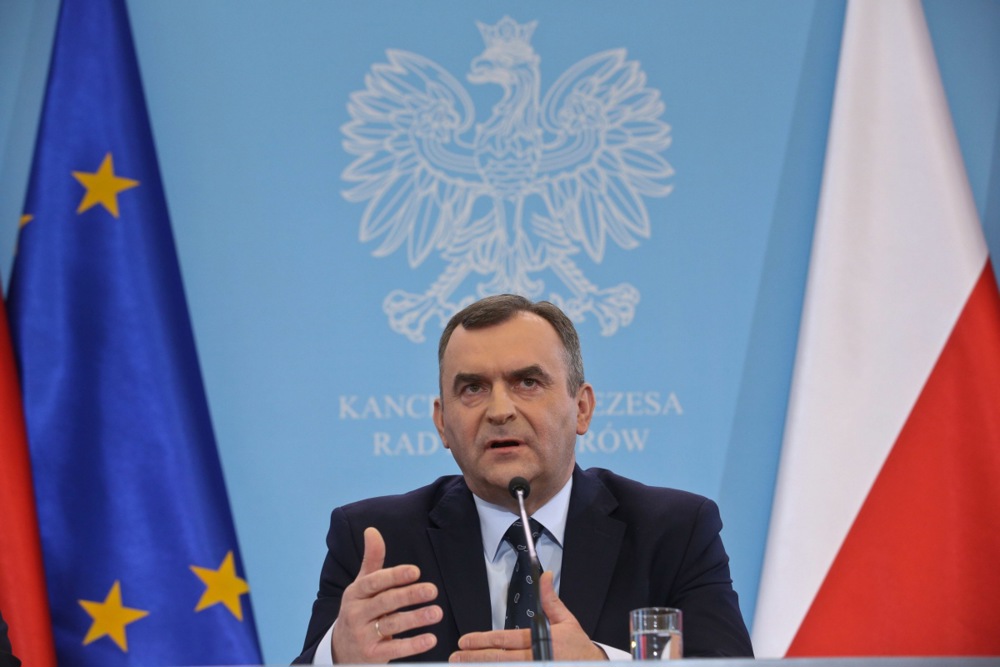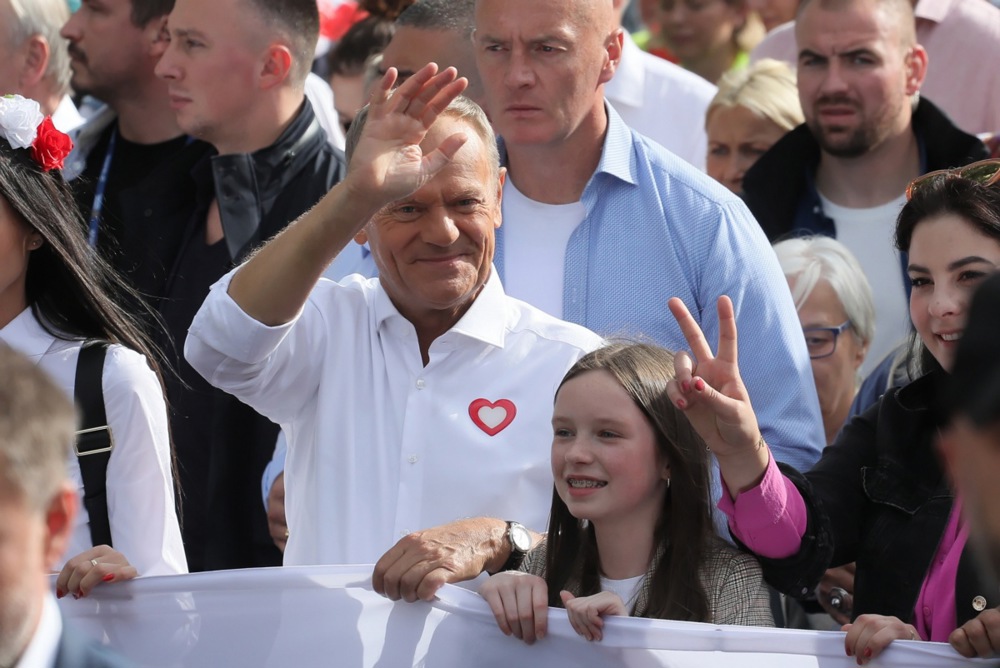Poland held its parliamentary elections in the middle of October and that poll with its record turnout of 74 per cent proved that reports of the demise of Polish democracy, like those of Mark Twain’s death, were greatly exaggerated.
The new parliamentary majority has agreed a coalition agreement which makes the transfer of power inevitable. The incumbent prime minister Mateusz Morawiecki is attempting to form a government as the outgoing conservative PiS did poll the largest number of votes and has most seats in the new parliament. But it will fail as PiS has no majority and no likely coalition partners for now.
The formation of a new government is not taking at all long in Poland by European standards. In Spain the election took place in July and it took until mid-November for a new government to be confirmed in the Cortez.
In Germany the formation of the current government took three months whereas Poland looks likely to complete the process of installing a new government in less than two.
The new government is a broad coalition of centre-Right, Centre and Left, very similar to the one which currently controls the European Parliament. It inherits a country with one of the lowest unemployment rates in the EU. Its economy has been growing far faster than those in the west and south of Europe. Poland is becoming ever more affluent and, thanks to the policies of the last eight years of conservative government, is less unequal now. Levels of poverty have significantly declined.
The secret of Poland’s success over the past 30 plus years of transformation is that the country has managed to avoid its politics and economy being dominated by the kind of oligarchs who have plagued the vast majority of post-communist states.
This has not come about by accident. Jarosław Kaczyński and his brother Lech ever since the country became independent again in 1989 have campaigned against corruption and the excessive influence of former communist officials over many walks of life. Indeed, that is why the party they founded in early 2001 (PiS) is called “Law and Justice”.
The name of the party points to the fact that their party was set up to work for the observance of law and justice not only in the courtrooms but in society at large. While the party in its 22 year history has not avoided some black sheep and policies that were questionable from a rule of law perspective, Jarosław Kaczyński and his party have fought corruption and have protected state assets against pilfering by their managers.
But we have to be fair and acknowledge that Polish liberals with their policies of decentralisation to local government and emphasis of allowing market mechanisms to operate have also had a role to play in avoiding the oligarchisation of both the economy and Polish society.
Poland’s local government reforms decentralised significantly more power to the local level than anywhere else in the post-communist world. This created a potential public counter-weight to any budding local oligarchs.
Back in 1989, Poland’s economy was in very serious trouble and the country was for all intents and purposes financially insolvent. This led the first governments who came to power after the collapse of communism to move faster on the way to a market economy than seen in other parts of central and eastern Europe. The medicine was socially painful but had its economic upside. Poland this century has cashed in on the transformation that took place back in the 1990s.
Another factor which has helped is the lack of a colonial past. This means that the country does not beat itself up about the issue of immigration and can approach it pragmatically. The challenge of migration is only just beginning for Poland, but it still seems better placed to cope with it than are our Western societies. Poland has the opportunity to learn from the errors of Western states.
NATO and EU membership as well as a good geographical location have been essential ingredients too, but they do not in themselves explain the success Poland has enjoyed. Plenty of countries have had a good location and membership of these bodies without having as much success.
The lack of oligarchy cannot be underestimated. There has been petty corruption, nepotism and cronyism in Poland, but no oligarchy. Compared with places like Russia, Ukraine and the Balkan countries, Poland has no oligarchs.
This is important because in Central and Eastern Europe the oligarchs have rarely been great innovators and entrepreneurs, but rather parasites on the body politic.
This is why whoever governs Poland in the foreseeable future should have a stable economy and society helping them to punch their country’s weight in both the EU and NATO. The days of Poland being patronised and told that it should be grateful for membership are over for good.
Apart from 2022, when Poles offered highly generous and consistent support for Ukraine and its people, Poland has not had a good press in the mainstream European media. The image conveyed was of a country that is nationalistic, xenophobic, anti-Semitic, homophobic, disrespectful to the rule of law and in which authoritarianism was spreading and limiting media freedom.
To be fair, that image was also being transmitted westwards by liberal and Left politicians who were in what they themselves called “total opposition” to the conservative government which ruled the country for the past eight years.
It was always a dubious narrative as even a cursory examination of the facts reveals. Evidence cited for extreme nationalism was based on the annual independence day marches of November 11 at which there was some display of extreme nationalist paraphernalia.
Guy Verhofstadt in the European Parliament called these marchers “thousands of fascists and Nazis”. But in reality, the vast majority who attended those marches were people who were proud of being patriots waving the flag in the same way Americans or the British wave theirs.
The “nationalist” label has become a pejorative term with which liberals and the Left proverbially bash opponents over their heads. It now conflates those flag waving crowds on independence day with the small minority of those who are racists or who really do hate foreigners.
Extreme xenophobia and anti Semitism also turned out to be much exaggerated. A survey of migrants funded b y the EU actually found that migrants to Poland complained far less about discrimination and racism than their counterparts in the West. Jews also feel much safer in today’s largely Israel sympathetic Poland than in Germany, France or Britain.
The homophobia charge was justified on the grounds that the Catholic Church in Poland is hostile to LGBT and the PiS-controlled public media allegedly demonised that community. But LGBT campaigners spread fake news such as claiming there were “LGBT free zones” in Poland. What had in fact happened is that some regions adopted legally non-binding resolutions to support a “charter for the family”, which pledged to block LGBT indoctrination in schools.
Equality parades now take place undisturbed in Poland and the LGBT lobby is active and influential in the worlds of the arts and also with the incoming government. The new coalition’s agreement includes measures to tackle hate speech against LGBT. This has it own risks as it opens up the risk that this may be abused to limit the right of free speech.
It is certainly the case that the top-down judicial reforms which were introduced by the PiS government were controversial at home and abroad. They resulted in a major row with the EU that led to the blocking of post-pandemic funds for Poland. But a closer examination of what actually happened shows that these changes have had little effect other than a change of some of the personnel in the top judiciary.
No one has yet produced any evidence that actual court verdicts have become partial to the PiS government or its supporters. Some argue that the opposite is in fact the case.
If Jarosław Kaczyński and his party aimed to impose an authoritarian regime in Poland, they have failed miserably. Yes, PiS did seize control of public media but it is highly debatable whether their propagandist stances served the authorities well.
Moreover, the vast majority of the commercial electronic media and press were critical or neutral towards the PiS government. This meant that, regardless of whether this was the intention, Poland’s media environment has become more pluralistic than it has ever been in the past. The paradox is that once the new coalition government seizes public media, the era of pluralism in the Polish media could effectively be over. The conservative voice could be silenced.
This is why at this year’s November independence day march in Warsaw tens of thousands marched in good spirits, proud to be carrying the white and red flag. A country which had suffered so much during the partitions, the Second World War and Soviet occupation is now enjoying its place in the sun, a democracy and society that has achieved much and avoided the pitfalls of oligarchy.






Tusk shows no signs of having learnt why his party lost power in 2015 – however unlikely it now seems, history will repeat itself unless he changes tack